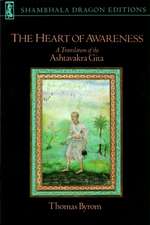The Spirit of Noh: A New Translation of the Classic Noh Treatise the Fushikaden
Autor Zeami Traducere de William Scott Wilsonen Limba Engleză Paperback – 13 mai 2013
William Scott Wilson, acclaimed translator of samurai and Asian classics, has translated the Fushikaden, the best known of these treatises, which provides practical instruction for actors, gives valuable teachings on the aesthetics and spiritual culture of Japan, and offers a philosophical outlook on life. Along with the Fushikaden, Wilson includes a comprehensive introduction describing the historical background and philosophy of Noh, as well as a new translation of one of Zeami's most moving plays, Atsumori.
Preț: 87.15 lei
Preț vechi: 106.06 lei
-18% Nou
Puncte Express: 131
Preț estimativ în valută:
16.68€ • 17.34$ • 13.82£
16.68€ • 17.34$ • 13.82£
Carte disponibilă
Livrare economică 14-21 ianuarie 25
Livrare express 28 decembrie 24 - 03 ianuarie 25 pentru 37.31 lei
Preluare comenzi: 021 569.72.76
Specificații
ISBN-13: 9781590309940
ISBN-10: 1590309944
Pagini: 175
Dimensiuni: 137 x 193 x 15 mm
Greutate: 0.2 kg
Editura: Shambhala Publications Inc
ISBN-10: 1590309944
Pagini: 175
Dimensiuni: 137 x 193 x 15 mm
Greutate: 0.2 kg
Editura: Shambhala Publications Inc
Notă biografică
Zeami (1363-1443) is considered the most important playwright, actor, and theorist in the history of Japanese Noh theatre. Along with his father, Kan'ami, he revolutionized Noh, turning it into a nuanced art form that greatly influenced many aspects of Japanese art and culture. He was a prolific writer, and his plays make up a significant part of the Noh repertoire.















